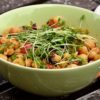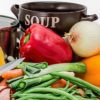This recipe comes to us from 2019 Hazon Food Conference Presenter Susan Barocas. These pancake-like omelets are full of flavor from the green onions, herbs and allspice. Cooked in olive oil, they are traditionally served during Hanukkah in Syrian communities, although ejjeh are tasty and satisfying year round when you will find them at street stands throughout the Mid East. There are many variations including with grated potatoes (Syrian ejjeh batata) or zucchini (ejjeh kusa). Ejjeh are usually served stuffed into pita or flatbread with pickled vegetables, cucumbers and fresh tomatoes. Makes eight 3-inch patties Ingredients 4 large eggs 6 tbsp scallions, green and white parts chopped small 4 tbsp parsley 3-4 tbsp mint, dill and/or cilantro, chopped small ½ cup chickpea flour 1 tsp ground allspice 1 tsp salt Ground black pepper to taste ½ cup pure olive oil Preparation In a large bowl, beat the eggs, then add all the ingredients except the olive oil. Mix well. Cooking Heat the oil in a large skillet at medium temperature. The oil is ready when a drop of water or batter sizzles in it. For each edgeh, drop a heaping tablespoon of batter into the hot oil. Flatten slightly with […]












